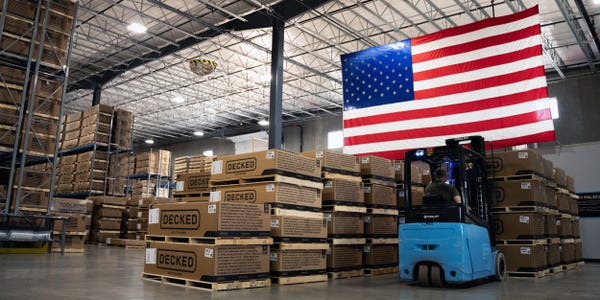## Your Favorite Games Might Be About to Get a Whole Lot More Expensive
Ever wonder where all those awesome games you love come from? Chances are, a hefty chunk of them are manufactured in China. But a new report from a major logistics company paints a grim picture for the future of gaming, specifically for smaller developers and publishers.

That’s right, your indie darlings and promising newcomers might vanish from the scene – all because of a global economic storm brewing across the Pacific.
But what does this mean for you? Buckle up, because we’re diving deep into the world of international trade and exploring how these tariffs could shake the foundations of the gaming industry as we know it.Navigating Uncertainty: Strategies for Gamers and Businesses

In the midst of global trade tensions and tariffs, businesses and gamers alike are facing unprecedented uncertainty. According to Ryan Petersen, CEO of Flexport, a logistics company, 80% of small businesses that buy from China could “just die” due to the tariffs imposed by the US government. This dire prediction highlights the need for businesses to adapt and mitigate the impact of tariffs through diversification and innovation.

Supporting Local: Exploring Alternative Game Developers and Supporting Local Gaming Communities
One strategy for gamers and businesses to navigate the uncertainty of tariffs is to support local game developers and gaming communities. By doing so, they can reduce their reliance on Chinese imports and contribute to the growth of their local economies. This approach not only benefits the local community but also helps to promote a more resilient and sustainable gaming industry.
- Look for local game developers and studios that offer unique and innovative games.
- Support local gaming communities by attending events, joining online forums, and participating in gaming tournaments.
- Consider partnering with local businesses to create gaming-related products and services.
- Diversify your supply chain by sourcing products and services from multiple countries and suppliers.
- Invest in innovation by developing new products, services, and business models that leverage emerging technologies.
- Develop strategic partnerships with other businesses and organizations to share resources and expertise.
- Raise awareness about the impact of tariffs on the gaming industry through social media, online forums, and gaming events.
- Petition policymakers to adopt more equitable trade policies that benefit the gaming industry.
- Support organizations and initiatives that promote fair trade and sustainable gaming practices.
Building Resilience: How Businesses Can Adapt and Mitigate the Impact of Tariffs
Beyond supporting local, businesses can build resilience by diversifying their supply chains and investing in innovation. By doing so, they can reduce their dependence on Chinese imports and mitigate the impact of tariffs. This approach requires a strategic and forward-thinking approach to supply chain management and innovation.
Advocating for Change: The Role of Gamers in Pushing for Fair Trade Policies
Finally, gamers can play a critical role in advocating for fair trade policies that benefit the gaming industry. By raising awareness about the impact of tariffs on the gaming industry, gamers can influence policymakers to adopt more equitable trade policies. This approach requires a collective effort from gamers, game developers, and businesses to promote a more sustainable and equitable gaming industry.
Beyond the Games: A Look at the Broader Consequences
The impact of tariffs on the gaming industry is just one aspect of a broader global trade landscape. The US-China trade war has far-reaching consequences for international relations, global stability, and the global economy. In this section, we will examine the broader implications of tariffs on global trade and the gaming industry.
Global Trade Tensions: How the US-China Trade War Impacts International Relations and Global Stability
The US-China trade war has created a complex web of international relations and global stability. The tariffs imposed by the US government have led to retaliatory measures from China, which has resulted in a global trade war. This conflict has far-reaching consequences for international relations, global stability, and the global economy.
- The US-China trade war has created a rift between the two countries, which has damaged their diplomatic relations and trade agreements.
- The conflict has also led to a decline in global trade, which has resulted in a slowdown in economic growth.
- The impact of the trade war on global stability is a concern for policymakers and experts, who are worried about the potential for a global recession.
- The economic slowdown caused by the US-China trade war has led to a decline in global trade, which has resulted in a slowdown in economic growth.
- The impact of the economic slowdown on the global economy is a concern for policymakers and experts, who are worried about the potential for a global recession.
- The economic slowdown has also led to a decline in consumer spending, which has resulted in a slowdown in economic growth.
- The long-term implications of tariffs on the global gaming landscape are a concern for gamers, game developers, and businesses.
- The tariffs imposed by the US government have led to a decline in global trade, which has resulted in a slowdown in economic growth.
- The impact of the economic slowdown on the global gaming industry is a concern for policymakers and experts, who are worried about the potential for a global recession.
Economic Slowdown: The Potential for Tariffs to Contribute to a Global Recession
The economic slowdown caused by the US-China trade war has far-reaching consequences for the global economy. The tariffs imposed by the US government have led to a decline in global trade, which has resulted in a slowdown in economic growth. This slowdown has the potential to contribute to a global recession, which would have devastating consequences for the global economy.
The Future of Gaming: Analyzing the Long-Term Implications of Tariffs on the Global Gaming Landscape
The long-term implications of tariffs on the global gaming landscape are a concern for gamers, game developers, and businesses. The tariffs imposed by the US government have led to a decline in global trade, which has resulted in a slowdown in economic growth. This slowdown has the potential to contribute to a global recession, which would have devastating consequences for the global gaming industry.
Global Trade Tensions: The Impact on the California Wine Industry
The US-China trade war has had a significant impact on the California wine industry. The tariffs imposed by the US government have led to a decline in global trade, which has resulted in a slowdown in economic growth. This slowdown has the potential to contribute to a global recession, which would have devastating consequences for the California wine industry.
The California Wine Industry: A Victim of the US-China Trade War
The California wine industry is a significant contributor to the state’s economy, with wine exports generating over $1.3 billion in revenue in 2022. However, the tariffs imposed by the US government have led to a decline in global trade, which has resulted in a slowdown in economic growth. This slowdown has the potential to contribute to a global recession, which would have devastating consequences for the California wine industry.
- The tariffs imposed by the US government have led to a decline in global trade, which has resulted in a slowdown in economic growth.
- The impact of the economic slowdown on the California wine industry is a concern for policymakers and experts, who are worried about the potential for a global recession.
- The California wine industry is a significant contributor to the state’s economy, with wine exports generating over $1.3 billion in revenue in 2022.
- Advocate for fair trade policies that benefit the California wine industry.
- Promote the California wine industry through social media, online forums, and gaming events.
- Support organizations and initiatives that promote fair trade and sustainable wine practices.
Supporting the California Wine Industry: A Call to Action
The California wine industry is facing significant challenges due to the US-China trade war. However, there are steps that can be taken to support the industry and mitigate the impact of tariffs. By advocating for fair trade policies and promoting the California wine industry, we can help to ensure the long-term sustainability of the industry.
Conclusion
The escalating trade war, fueled by Trump’s tariffs on Chinese imports, is casting a long shadow over the American business landscape, particularly for small businesses. As the CEO of a prominent logistics company warns, the economic repercussions could be devastating, potentially pushing 80% of small businesses reliant on China for goods towards insolvency. This stark prediction underscores the precarious position these companies find themselves in, caught between rising costs and shrinking profit margins. The implications are far-reaching, extending beyond the immediate financial strain on small businesses. Job losses, supply chain disruptions, and a dampened consumer market could follow, further exacerbating the economic uncertainty. This situation raises critical questions about the long-term viability of sourcing from China, forcing businesses to reconsider their strategies and explore alternative avenues. While the outcome remains uncertain, one thing is clear: the trade war is a high-stakes gamble with potentially devastating consequences for the American economy. The question is, can our small businesses weather the storm, or will they be the collateral damage in a larger geopolitical struggle?
